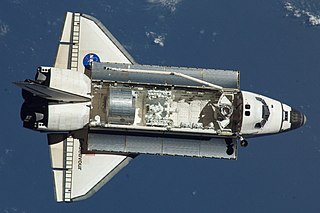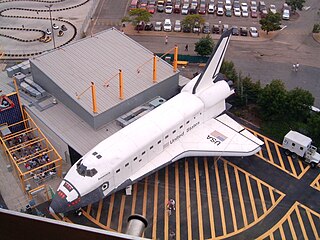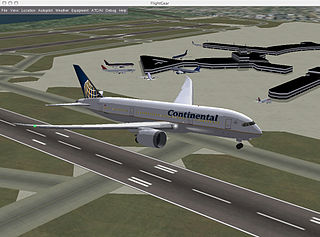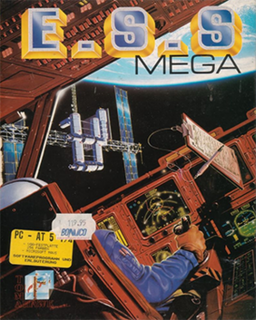
The Space Shuttle was a partially reusable low Earth orbital spacecraft system operated from 1981 to 2011 by the U.S. National Aeronautics and Space Administration (NASA) as part of the Space Shuttle program. Its official program name was Space Transportation System (STS), taken from a 1969 plan for a system of reusable spacecraft where it was the only item funded for development. The first of four orbital test flights occurred in 1981, leading to operational flights beginning in 1982. Five complete Space Shuttle orbiter vehicles were built and flown on a total of 135 missions from 1981 to 2011, launched from the Kennedy Space Center (KSC) in Florida. Operational missions launched numerous satellites, interplanetary probes, and the Hubble Space Telescope (HST), conducted science experiments in orbit, participated in the Shuttle-Mir program with Russia, and participated in construction and servicing of the International Space Station (ISS). The Space Shuttle fleet's total mission time was 1,322 days, 19 hours, 21 minutes and 23 seconds.

Space Shuttle Endeavour is a retired orbiter from NASA's Space Shuttle program and the fifth and final operational Shuttle built. It embarked on its first mission, STS-49, in May 1992 and its 25th and final mission, STS-134, in May 2011. STS-134 was expected to be the final mission of the Space Shuttle program, but with the authorization of STS-135, Atlantis became the last shuttle to fly.
USS Enterprise may refer to the following ships and other vessels:

A simulation is the imitation of the operation of a real-world process or system over time. Simulations require the use of models; the model represents the key characteristics or behaviors of the selected system or process, whereas the simulation represents the evolution of the model over time. Often, computers are used to execute the simulation.
The original meaning of the word shuttle is the device used in weaving to carry the weft. By reference to the continual to-and-fro motion associated with that, the term was then applied in transportation and then in other spheres. Thus the word may now also refer to:

Orbiter is an open source space flight simulator program developed to simulate spaceflight using realistic Newtonian physics. The simulator was released on 27 November 2000; the latest edition, labeled "Orbiter 2016", was released on 30 August 2016, the first new version of the simulator since 2010.

The Space Shuttle Pathfinder is a Space Shuttle test simulator made of steel and wood. Constructed by NASA in 1977 as an unnamed facilities test article, it was purchased in the early 1980s by the America-Japan Society, Inc. which had it refurbished, named it, and placed it on display in the Great Space Shuttle Exhibition in Tokyo. The mockup was later returned to the United States and placed on permanent display at the U.S. Space & Rocket Center in Huntsville, Alabama, in May 1988.

The Kennedy Space Center Visitor Complex is the visitor center at NASA's Kennedy Space Center on Merritt Island, Florida. It features exhibits and displays, historic spacecraft and memorabilia, shows, two IMAX theaters, and a range of bus tours of the spaceport. The "Space Shuttle Atlantis" exhibit contains the Atlantis orbiter and the Shuttle Launch Experience, a simulated ride into space. The center also provides astronaut training experiences, including a multi-axial chair and Mars Base simulator. The visitor complex also has daily presentations from a veteran NASA astronaut. A bus tour, included with admission, encompasses the separate Apollo/Saturn V Center. There were 1.7 million visitors to the visitor complex in 2016.
Mission: Space is a space-themed pavilion and attached centrifugal motion simulator attraction located on the eastern side of Future World at Epcot, a theme park at the Walt Disney World Resort in Bay Lake, Florida. The attraction simulates what an astronaut might experience aboard a spacecraft on a mission to Mars, from the higher g-force of liftoff to the speculative hypersleep. The pavilion includes a gift shop titled Mission Space: Cargo Bay, an interactive children's play area called the Advanced Training Lab, and a restaurant titled Space 220.

Space Shuttle America was a motion simulator ride at the Six Flags Great America theme park in Gurnee, Illinois, that opened in 1994. The ride's main feature was a full-scale replica of an American Space Shuttle orbiter. It closed permanently after the 2007 season and was removed in December 2009.

The Space Shuttle orbiter is the spaceplane component of the Space Shuttle, a partially reusable orbital spacecraft system that was part of the discontinued Space Shuttle program. Operated from 1977 to 2011 by NASA, the U.S. space agency, this vehicle could carry astronauts and payloads into low Earth orbit, perform in-space operations, then re-enter the atmosphere and land as a glider, returning its crew and any on-board payload to the Earth.
Vehicle simulation games are a genre of video games which attempt to provide the player with a realistic interpretation of operating various kinds of vehicles. This includes automobiles, aircraft, watercraft, spacecraft, military vehicles, and a variety of other vehicles. The main challenge is to master driving and steering the vehicle from the perspective of the pilot or driver, with most games adding another challenge such as racing or fighting rival vehicles. Games are often divided based on realism, with some games including more realistic physics and challenges such as fuel management.
A space flight simulation is a genre of flight simulator video games that lets players experience space flight to varying degrees of realism. Common mechanics include space exploration, space trade and space combat.

Amateur flight simulation refers to the simulation of various aspects of flight or the flight environment for purposes other than flight training or aircraft development. A significant community of simulation enthusiasts is supported by several commercial software packages, as well as commercial and homebuilt hardware. Open-source software that is used by the Aerospace industry like FlightGear, whose flight dynamics engine (JSBSim) is used in a 2015 NASA benchmark to judge new simulation code to space industry standards, is also available for amateur use. A popular type of amateur flight simulators are combat flight simulators, which simulate combat air operations from the pilot and crew's point of view. Combat flight simulation titles are more numerous than civilian flight simulators due to variety of subject matter available and market demand.

E.S.S Mega is a space simulation game published by Tomahawk and developed by Coktel Vision. E.S.S. Mega recreates ESA's space vehicle concepts of the early 1990, specially the Hermes Shuttle. The game was released for MS-DOS and Atari ST in 1991, and Amiga CDTV in 1992.

Space Shuttle: A Journey into Space is a space flight simulator game designed by Steve Kitchen for the Atari 2600 and published by Activision in 1983. It is one of the first realistic spacecraft simulations available for home systems. Space Shuttle was adapted to the Atari 8-bit family and Atari 5200 by Bob Henderson (1984), then ported to the ZX Spectrum (1984), Commodore 64 (1984), Amstrad CPC (1986), and MSX (1986). The 1984 Activision Software catalog also mentions an Apple II version.
An orbital vehicle is a spacecraft which attains orbit.










